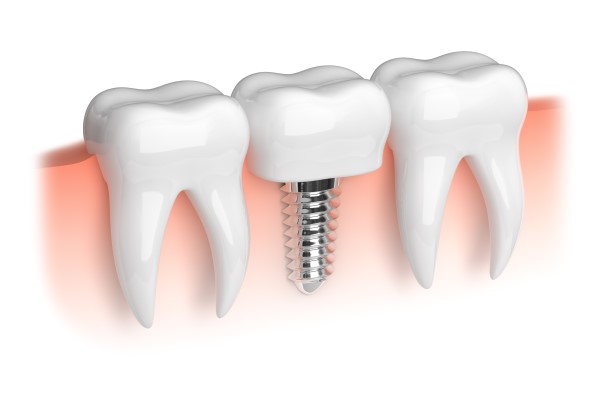Dental Implant Restoration for a Missing Tooth

A dental implant restoration is a great way of getting a patient’s missing tooth back. The tooth might have gone away because of decay or damage to the area. The good news is it does not have to be missing forever. Implants are posts that go into the patient’s jawbone to act as the missing tooth’s roots. The dentist will then have a false tooth placed over the implant to serve as the tooth’s visible portion. Keep reading to learn more about the process for replacing your missing teeth and how it works.
A dental implant restoration option
There are many choices when choosing the right dental implant restoration and material type. If a patient needs only one tooth replaced, it is possible to pick a dental crown over an implant post. However, if several adjacent teeth are missing, a bridge over implants might work better. Patients might choose from zirconia or porcelain as far as materials go. Each is durable and looks natural, and can be used in any portion of the mouth. The dentist will pick the right color to match the rest of the teeth.
The process of placing a dental implant restoration
The patient will need to have two surgeries done to place the implants. During the consultation appointment, the dentist will take some imaging to find the right treatment plan. If the patient has some bone loss, they might not immediately be the right candidate for the procedure. Instead, some bone grafting might be necessary to build up the jawbone.
Then the patient can have the implant placed. Anesthesia is given before the surgery. The patient will have an incision made in the gumline, creating a hole in that jawbone. The dentist can place the implant through that hole, stitching the gums closed after.
The implants will fuse to the bone throughout around three to six months. Then the patient is ready for the next step. That involves making an incision into the gums again, exposing the implant. Then the dentist will attach the abutment to the implant. That connects the implant to the crown for a better fit. The dentist stitches the gums closed after that but does it so the abutment is exposed.
The abutment helps the restoration and implant connect. However, the patient will need to heal for around two weeks first. Finally, the dentist can place the repair over the teeth. This piece is customized to fit the patient’s teeth better. That way, it will not interfere with the bite or feel uncomfortable. Over time, the new tooth will start to feel completely natural, completing the patient’s smile.
Choose the right dental implant restoration today
When it comes to dental implant restorations, you have a range of options to choose from. That way, you can get the one that meets your needs. The dentist can help you pick the right restorations for your smile. Making an appointment today is the first step in a better smile.
Request an appointment here: https://riverfallsfamilydental.com or call River Falls Family Dental at (812) 962-7342 for an appointment in our New Albany office.
Check out what others are saying about our dental services on Yelp: Dental Implant Restoration in New Albany, IN.
Related Posts
As you age, your teeth face challenges from numerous issues. Daily wear from chewing food or stress-related grinding, gum problems from bacteria build-up, and tooth damage from the foods and drinks you consume all play a role in the deterioration of your smile.You and your dentist share a common goal: caring for and preserving your…
Are you in need of dental restoration and don’t know where to turn? You are not alone. Countless patients ask themselves this nagging question daily. We all want to have the most beautiful and bright smile but aren’t sure how to achieve our goal. Fortunately, there are solutions that you can count on. There are many…
Dentists perform dozens of types of dental restorations, ranging from minimally invasive fillings to invasive but wholly restorative dental implants. When a dentist discusses the need for you to invest in restoration, you may wonder how they will make a recommendation. What factors will the dentist consider when deciding what techniques and materials to use…
Dental bonding is one of the more popular forms of dental restoration due to the cosmetic benefits they offer and the minimally invasive treatment process. This review discusses why a dentist may recommend dental bonding over alternative dental restoration options to repair a damaged, stained, or misshapen tooth.The most common types of concerns that dental…
